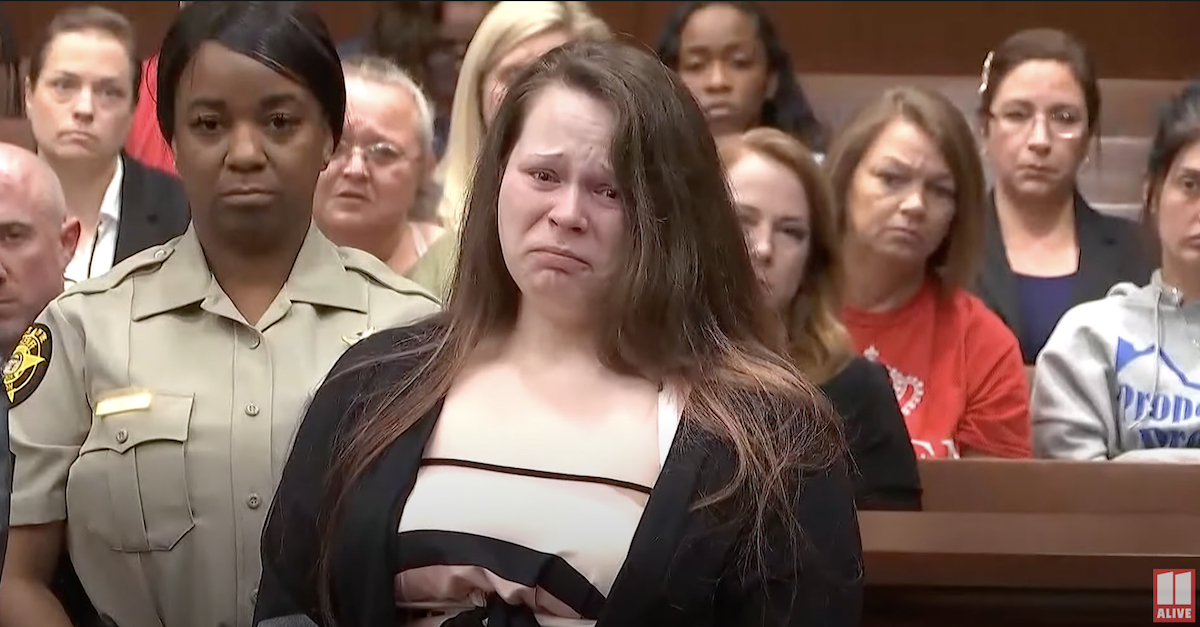
Cortney Bell during her 2019 trial.
The Court of Appeals of Georgia has overturned the murder conviction of a mother in the 2017 death of her newborn daughter, reasoning that the “evidence was insufficient” for a jury to find her guilty of second-degree murder and second-degree cruelty to children. The three-judge panel, however, upheld Cortney Bell’s conviction on the felony charge of contributing to the dependency of a minor.
Bell in 2019 was tried jointly with the victim’s father, Christopher McNabb, for killing 2-week-old Caliyah McNabb. Approximately an hour after closing arguments were presented, a jury of six men and six women found Bell guilty on charges of second-degree murder, child cruelty, and felony contributing to the dependency of a minor. McNabb was convicted on charges of malice murder, felony murder, aggravated battery, and concealing a death.
The trial judge sentenced Bell to serve 30 years on the merged murder and child cruelty charges, with 15 years to be served in prison and 15 years on probation. On the contributing to dependency of a minor charge, the court sentenced Bell to 10 years in prison, to be served concurrent with the murder sentence.
An autopsy determined that Caliyah died “rapidly” after sustaining “extensive head trauma.” Court records stated that McNabb struck Caliyah with “an unknown object” that caused “the victim’s skull to be seriously disfigured and damaged beyond repair.” Her skull was so damaged that the pathologist who performed the autopsy said that her “deciduous teeth” — those that hadn’t yet emerged from the gums — “had come out” and were visible.
After reviewing the evidence in the light most favorable to the prosecution, however, the appellate court found that a rational juror could not have found that Bell committed the elements essential to prove murder beyond a reasonable doubt. Specifically, the court reasoned that her actions could not be seen as “causing” Caliyah “cruel and excessive physical pain through the infliction upon her of blunt force trauma to her head,” as was stated in her indictment.
“There was no evidence presented that Bell directly caused the victim cruel and excessive pain by inflicting blunt force trauma to her head; caused someone else to commit the act; aided or abetted in the act; or that she advised, encouraged, hired, counseled or procured someone to commit the act,” the appellate court wrote in the 39-page ruling. “There was nothing to exclude the reasonable possibility that she was asleep when the victim was taken from the home and/or killed, and there was nothing in her actions before, during, or after the victim’s disappearance and death from which the jury could make such an inference.”
Trial testimony from friends and family members indicated that McNabb and Bell had a tumultuous relationship, rife with drug addiction and physical abuse. Bell on Oct. 1, 2017 left a then-8-day-old Caliyah and her 2-year-old sister with family because there was “some violence going on” at the mobile home she shared with McNabb.
Caliyah’s paternal grandfather kept Caliyah at his home until Bell and McNabb made the home more suitable for the children. He returned the children to the parents on Oct. 6, 2017. He testified that when he pulled up to the home McNabb was “hiding behind a tree” because they “never got along much.” Bell’s cousin testified that he smoked methamphetamine with the couple that evening.
The following morning, Bell called the grandfather and others asking if they’d taken Caliyah because she was missing. She called 911 and told the dispatcher that when she woke up that morning the child was gone. Caliyah’s body was found the next day in the woods near the trailer. She’d been stuffed in McNabb’s gym bag, which still contained some of his clothing.
McNabb was arrested and charged with murder the day Caliyah’s body was discovered. Bell was arrested several months later, on Jan. 7, 2018.
In upholding the felony contributing to a minor charge, the court agreed that there was evidence Bell’s conduct in the day’s leading up to Caliyah’s death — such as doing meth and leaving the children around a volatile McNabb — “played a substantial part in her death and that death was a reasonably probable consequence of that neglect.”
Newton County District Attorney Randy McGinley said the state still has the opportunity to appeal the decision to the state supreme court.
Read the ruling below.
[image via WXIA screengrab]
Have a tip we should know? [email protected]